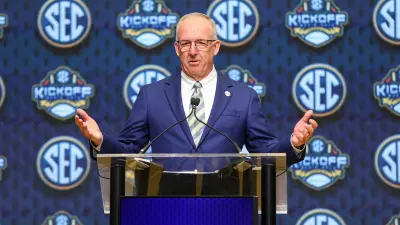By Kyle Golik
When Paul Simon wrote the lyrics to his opus “The Sound of Silence” off of Simon & Garfunkel’s classic “Wednesday Morning, 3 A.M.” The meaning behind it was the inability for people to communicate with each other. When the folk duo sang, “Hello darkness, my old friend. I’ve come to talk with you again. Because a vision softly creeping,” the news of a proposed revenue structure for this College Football Playoff version will be vastly different.
Ross Dellenger, of Yahoo Sports, reported the SEC and Big Ten are beginning to flex their influence by seeking a lion’s share of the annual revenue that the two power conferences would split a 58% share of the total revenues. The ACC and Big XII would split a 32% share, leaving the remaining 10% to the Group of 5 schools and Notre Dame.
This is a far cry from what originally was agreed upon when the Power 5 would split evenly 80% of the revenues.
The ‘vision softly creeping in” by the Big Ten and SEC is motivated by more money because now they have more mouths to feed. The Big Ten is on somewhat borrowed time as Oregon and Washington are on partial revenue shares and the SEC is doing its due diligence to make more money for its 16 member schools but may decide to go shopping if the ACC dissolves.
With money continuing to be a motivator is what will ultimately lead us to a 14-team playoff in 2026, the news of the reconsideration of auto byes for the champions of Big Ten and SEC was all smoke in mirrors. TCU head coach Sonny Dykes saw through the smoke as well, saying this for ESPN last week. “Automatic first-round byes for the Big Ten and SEC is like the NFL saying the Cowboys get a first-round bye since they have more fans than the Bengals. How preposterous is that?” If those leagues got those automatic byes, I am certain they wouldn’t complain and it was purely a negotiation tactic to get more money.
Much like what destroyed the Pac-12, eerily the same conditions are brewing in the ACC as commissioner Jim Phillips is sitting on a powder keg and just trying to keep things together.
More Sports News
Internally, the ACC’s Grant of Rights clause is being tested by malcontent Florida State which seems to be heading to litigation. The cost it would take Florida State to leave the ACC was estimated to be $572 million with $429 million of that being forfeited media rights.
With Florida State being the most vocal, it seems the University of North Carolina is an interested observer capturing a blueprint that they may want to execute and they wouldn’t be alone if FSU somehow cracks the Grant of Rights clause.
Externally, Phillips is leading the ACC in a living example of the old proverb of “two’s a party, three’s a crowd.”
The Big XII is not a threat to disrupt the SEC and Big Ten, quite honestly there aren’t TV pieces in the conference to generate money that would excite the SEC and Big Ten at this juncture, but the ACC has those pieces.
Those pieces in the ACC already see an unlevel playing field; just from the proposed distribution, SEC and Big Ten teams would receive between $21 to 23 million per season, ACC around $13.7 million, and Big 12 around $12.3 million.
When you lump in the already disparity in media rights contracts, it is hard to convince significant brands to not leave your conference, where there are significant gaps everywhere.
As Simon wrote, “You do not know silence like a cancer grows,” the inability to communicate with one another on a macro level and not on a self-serving level is what has led college football to this cannibalization of one another. Conferences haven’t realized the wedge television and media dollars have done to student-athletes. Pac-12 softball players said of the realignment about mental health issues and the loss of traditional rivalries, something Missouri head coach Eli Drinkwitz and Ole Miss head coach Lane Kiffin supported.
Dellenger wrote in his piece that some ACC and Big XII administrators feeling the weight of the situation, “Would the Power Two really leave if we say no,” speaks volumes of the division between the Power 4 because the ACC’s existence all depends on a level playing field.
There is and there has been communication between the power conferences, but even with that communication the SEC and Big Ten’s insatiable desire for ruling power and money over the greater good of the rest of the landscape has led us to “silence.”

















